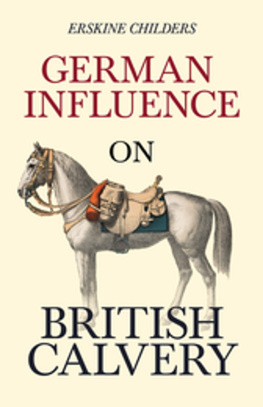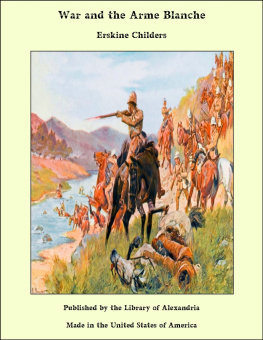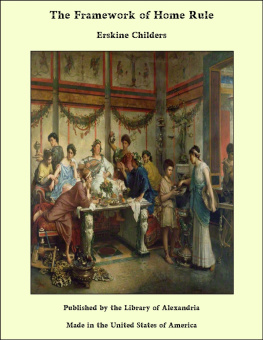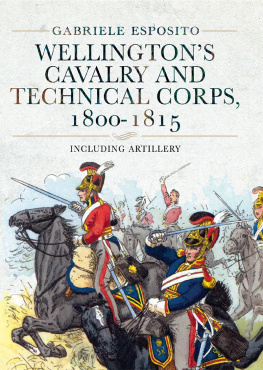GERMAN INFLUENCE
ON BRITISH CAVALRY
BY
ERSKINE CHILDERS
AUTHOR OF
"WAR AND THE ARME BLANCHE," "THE RIDDLE OF THE SANDS,"
"IN THE RANKS OF THE C.I.V."
EDITOR OF VOL. V. OF "THE 'TIMES' HISTORY OF THE WAR"
LONDON
EDWARD ARNOLD
1911
[All rights reserved]
Printed in Great Britain
PREFACE
This essay is meant to be read in connection with the facts and arguments adduced in my book of last year, "War and the Arme Blanche," with its Introduction by Field-Marshal Lord Roberts. From the nature of the case I have not been able to avoid a small measure of repetition, but I have done my best to confine myself to new ground.
A word about my object in writing again. Contemporaneously with the publication of "War and the Arme Blanche," General von Bernhardi published in Germany his "Reiterdienst," and an English edition, translated by Major G.T.M. Bridges, D.S.O., under the title "Cavalry in War and Peace," appeared simultaneously in this country. Like its predecessor, "Unsere Kavallerie im nchsten Kriege" (translated under the title "Cavalry in Future Wars"), this new book by General von Bernhardi was headed with a highly laudatory Preface from the pen of General Sir John French, who commended it to military students in this country as a brilliant and authoritative treatise on the employment of Cavalry in modern war. It was included in the valuable "Pall Mall Series" of military books, published by Hugh Rees and Co.; and, in short, unless the critical faculties and native common-sense of Englishmen can be aroused, it is likely to become a standard work. There exists, be it remembered, no similar work, modern and authoritative, by a British author.
My object in this essay is to arouse those critical faculties and that common-sense. Without any disrespect to General von Bernhardi, who writes, not for Englishmen, but, as a German reformer, for what he regards as an exceptionally backward Cavalry, I wish to show, not only that we have nothing to learn even from him in the matter of Cavalry combat, but that, if we only have the pluck and independence to break off the demoralizing habit of imitating foreign models, and to build on our own war experience and our own racial aptitudes, we have the power of creating a Cavalry incomparably superior in quality to any Continental Cavalry.
The indispensable condition precedent to that revival is to sweep away root and branch the tactical system founded on the lance and sword, and to create a new system founded on the rifle.
I shall endeavour to show, using von Bernhardi's "Reiterdienst," with Sir John French's Introduction, and our own official Manuals, as my text, that in the matter of modern Cavalry warfare no principles worthy of the name exist among professional men. The whole subject is in a state of chaos, to which, I believe, there is no parallel in all the arts of war and peace. And the cause of that chaos is the retention in theory of a form of combat which is in flagrant contradiction with the conditions exacted by modern firearms, and is utterly discredited by the facts of modern war.
The excellence of the translation furnished by Major Bridges has made it unnecessary for me to introduce into this essay the various terms and phrases used in the original German text. After a study of that text, I am satisfied, if Major Bridges will permit me to say so, that, obscure as the author's exposition often is, no part of the obscurity is due to the translator. I have not found a technical term of which he has not given the correct English equivalent, or a passage where he has not accurately interpreted the original sense.
Let me add that I have been encouraged further to write this essay by the keen and instructive controversy which followed the publication of my book of last year. Incidentally I have taken the opportunity in this volume to reply to some of the criticisms against its predecessor, and to clear up some points which I think were not fully understood.
E.C.
March, 1911.
CONTENTS
| CHAPTER | PAGE |
| I. |
| I. |
| II. |
| II. |
| III. |
| IV. |
| I. |
| II. |
| V. |
| I. |
| II. |
| III. |
| VI. |
| I. |
| II. |
| VII. |
| I. |
| II. |
| VIII. |
| I. |
| II. |
| III. |
| IV. |
| IX. |
| I. |
| II. |
| III. |
| X. |
GERMAN INFLUENCE ON BRITISH CAVALRY
CHAPTER I
INTRODUCTORY
I. The German Model.
Impartial observers of the recent controversy upon the merits of the lance and sword as weapons for Cavalry must have been struck by one singular circumstancenamely, that there exists in our language no standard modern work upon the tactics and training of Cavalry in modern war, written by a Cavalryman, accepted by Cavalrymen, and embodying and illustrating the lessons of the two great modern wars waged since the invention of the long-range, smokeless magazine rifle. Without such a work, controversy is seriously hampered. The need for it is beyond dispute.
Whatever the extent of the revolution brought about by the magazine rifle, a revolution, by universal admission, there is. Since 1901 a serious firearm has been substituted for the old carbine formerly carried by the Cavalry, and the Cavalry Manual has been rewritten, with increased stress on the importance of fire. It is also the fact that, from whatever causes, the lance and sword have proved, both in South Africa and Manchuria, almost innocuous weapons. These facts demand, to say the least, serious recognition from those who still hold that the lance and sword are the most important weapons of Cavalry. Angry letters to the daily press, desultory and superficial articles in the weekly and monthly press, are not enough. What is wanted is some comprehensive and authoritative exposition of what Cavalry functions are in modern war, how they have been modified by the firearm, and why, with chapter and verse, not by way of vague allegation, the only great wars in which that firearm has been tested are to be regarded as "abnormal" and uninstructive.
For illumination and confirmation on these matters, we are constantly referred, in defence of the lance and sword, by our own Cavalry authorities to foreign countries whose armies have had no experience at all of modern civilized war as revolutionized by the modern magazine rifle. We are referred, above all, to Germany, and, in particular, to the works of a German officer, General von Bernhardi, who (1) writes exclusively for the German Cavalry, without the most distant reference to our own; (2) whose own war experience dates from 1870, when he fought as a Lieutenant, and who has not seen the modern rifle used in civilized war; (3) who believes that no wars, ancient or modern, except the American Civil War of 1861-1865, afford an analogy to modern conditions, and that the modern Cavalryman must base his practice on "speculative and theoretical reflection"; (4) who states that the German Cavalry, owing to indifference to the revolution wrought by the modern firearm, and excessive adherence to "old-fashioned knightly combats," is at this moment wholly unprepared for war and is trained on Regulations which, though quite recently revised, he makes the subject of stinging and sustained ridicule; (5) who is so ignorant of the technique of fire-action by mounted troops that he renders it, unconsciously, more ridiculous even than shock-action; and (6) who firmly believes in the lance and sword, and in the shock-charge as practised "in the times of Frederick the Great and Napoleon."












